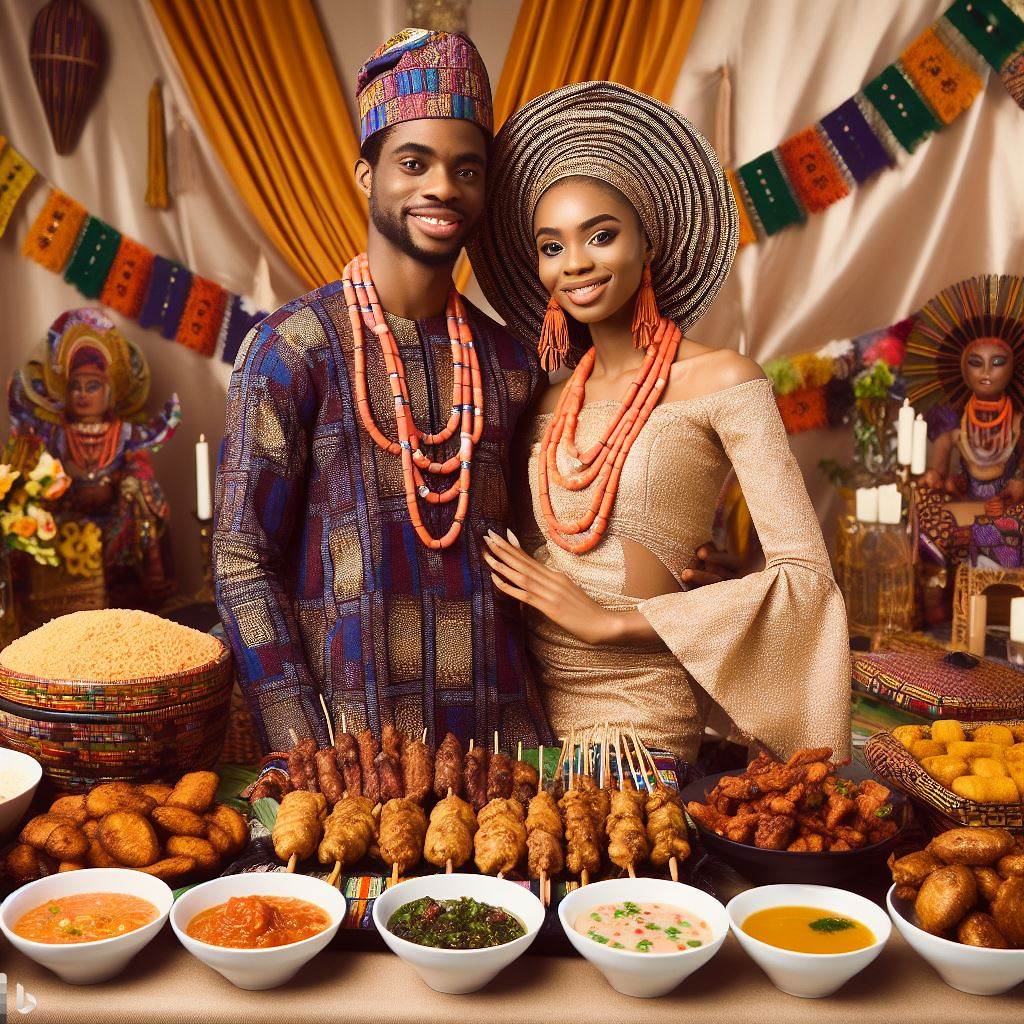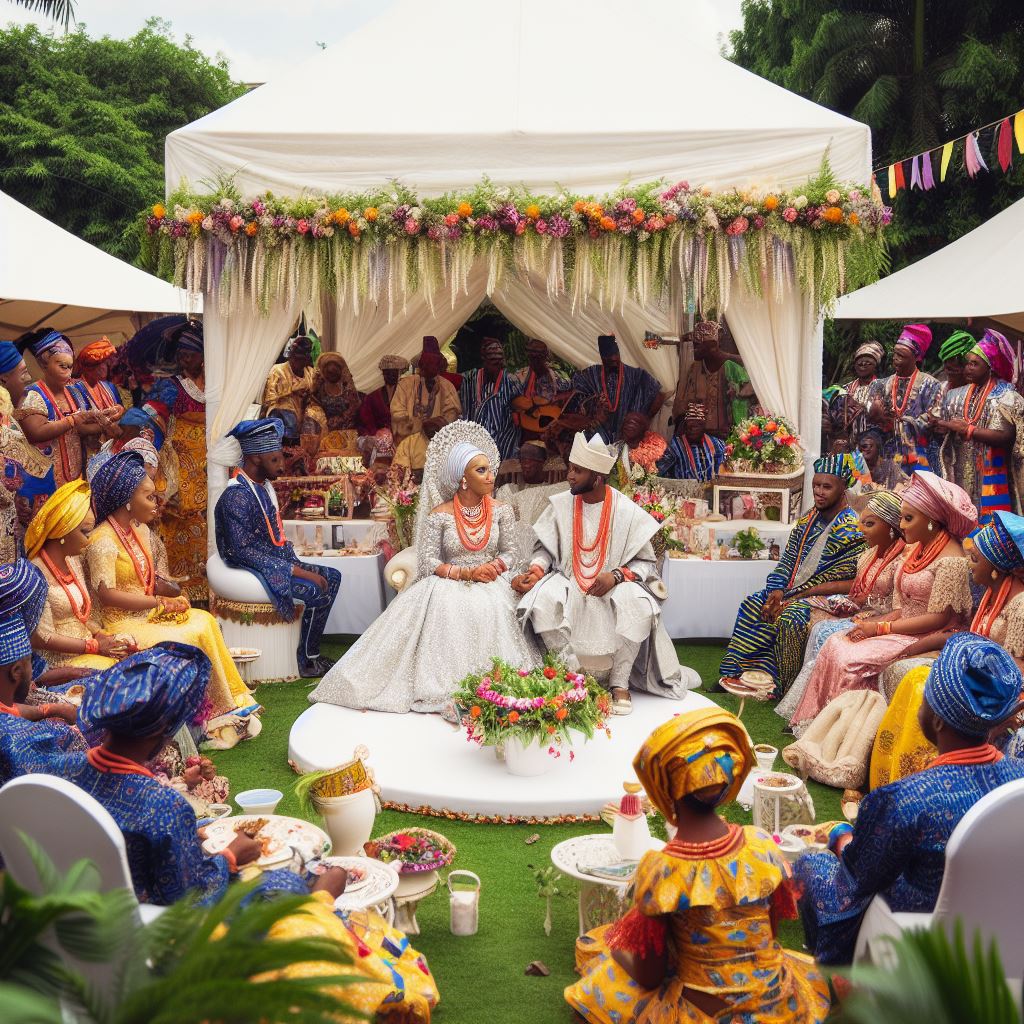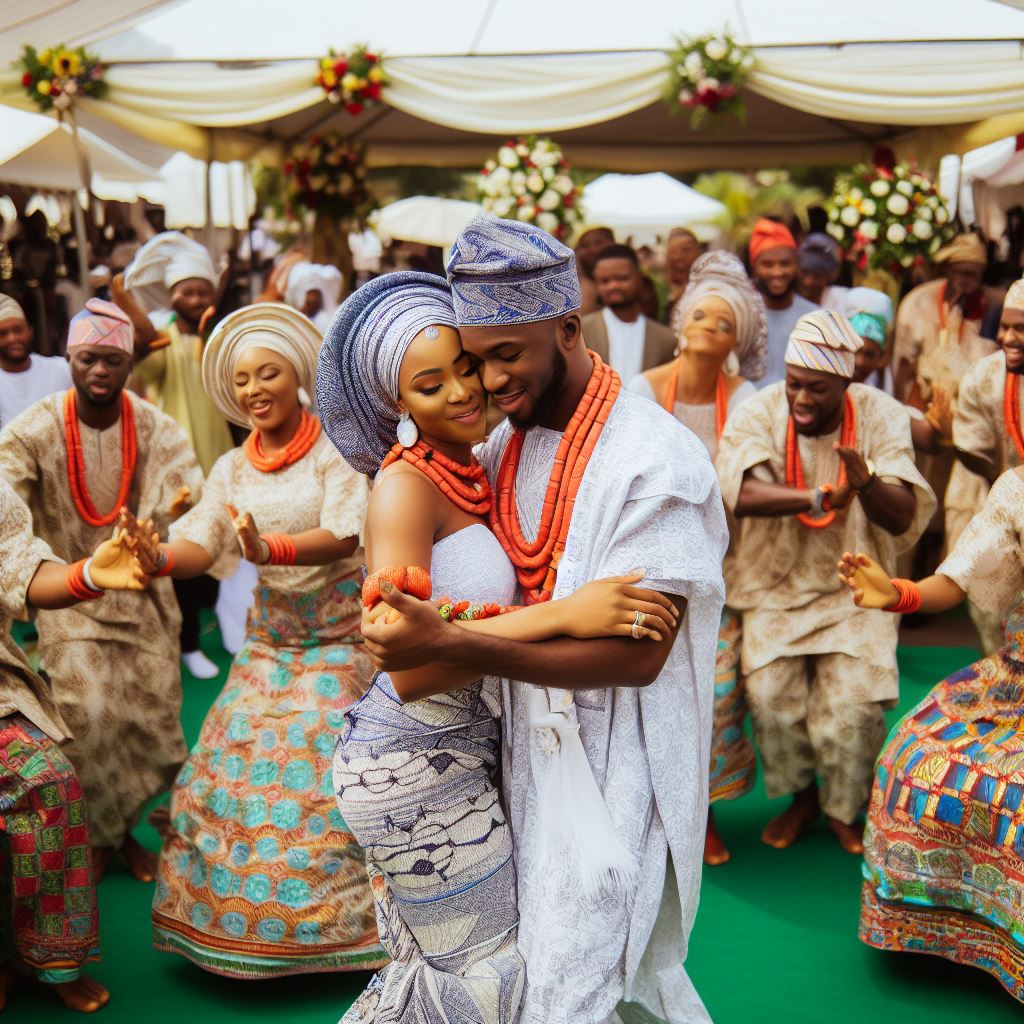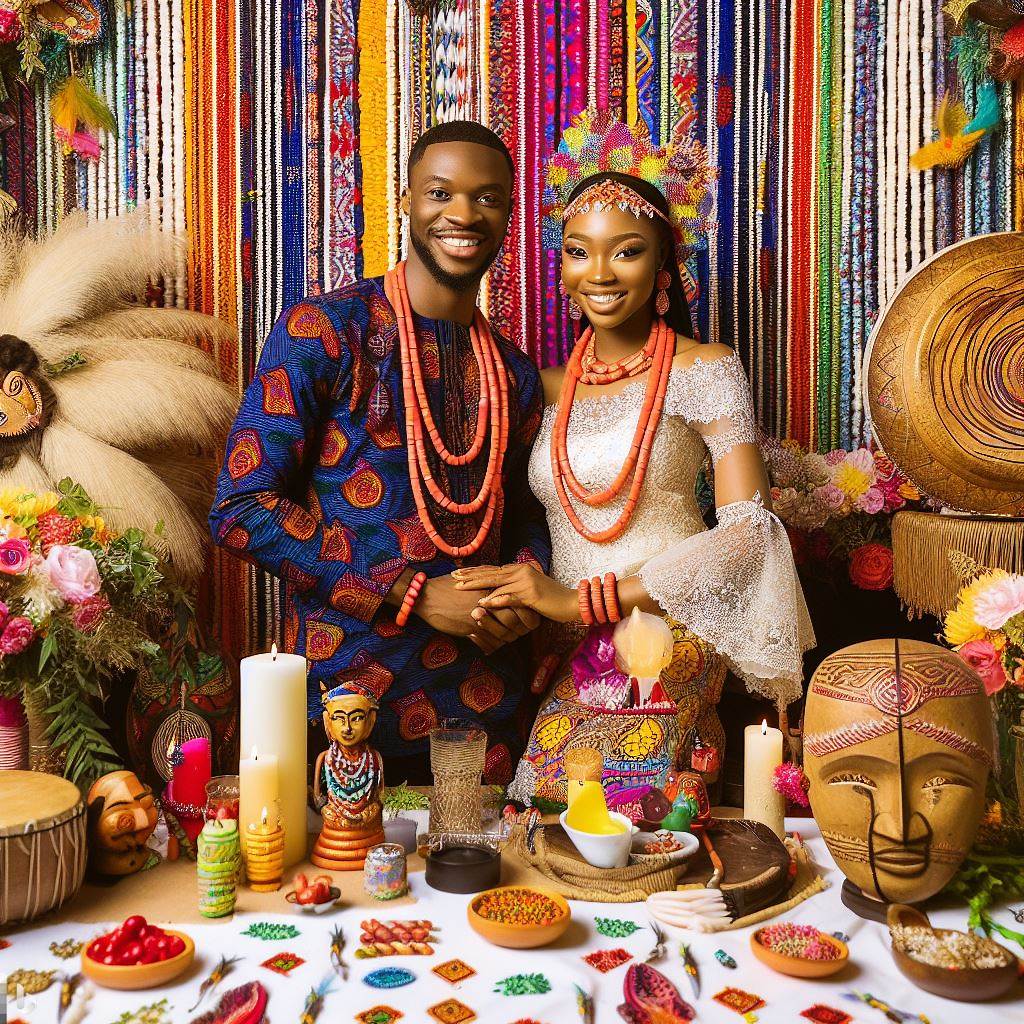Introduction
Nigerian Wedding Delicacies hold a significant place in the hearts and stomachs of those celebrating love. In Nigeria, food is more than sustenance; it’s a cultural cornerstone.
It brings people together, nurtures bonds, and reflects the nation’s rich diversity.
Importance of food in Nigerian culture and how it is a central part of the wedding celebrations.
- Food holds immense importance in Nigerian culture as it symbolizes unity and abundance, making it a central part of wedding celebrations.
- Nigerian weddings are no exception. These joyous celebrations feature an array of delectable dishes that not only tantalize taste buds but also embody the country’s multifaceted heritage.
- From traditional favorites to modern innovations, food plays a central role in the festivities.
Purpose of the blog post
In this blog post, we embark on a flavorful journey through some of the most popular and beloved dishes served at Nigerian weddings.
These culinary creations not only satisfy hunger but also symbolize the unity of families and the fusion of traditions. So, join us as we explore the delectable world of Nigerian Marriage Function Foods.
Traditional Nigerian Wedding Delicacies
Nigerian weddings are known for their vibrant celebrations and delicious food.
In this blog section, we will explore the variety of traditional Nigerian dishes that are typically served at weddings, each with its own unique flavors and ingredients.
From Jollof Rice to Suya, these delicacies are sure to tantalize your taste buds.
Jollof Rice
This iconic rice dish is a staple at Nigerian weddings. It is typically made with long-grain parboiled rice, tomato sauce, onions, and a variety of spices.
Jollof Rice is known for its rich flavor and vibrant red color. It can be served on its own or paired with a variety of meats and vegetables.
Moi Moi
Another popular dish at Nigerian weddings is Moi Moi, a steamed bean pudding. Made from ground black-eyed peas, peppers, onions, and spices, Moi Moi is a savory and comforting delicacy.
It is usually served as a side dish and can be enjoyed hot or cold.
Pounded Yam and Egusi Soup
Pounded Yam is a traditional Nigerian dish made from yam tubers. The yam is boiled and then pounded until it becomes a smooth and elastic dough-like consistency.
It is often served with Egusi Soup, a thick and flavorful soup made from ground melon seeds and a variety of vegetables. This combination is a hearty and satisfying meal at Nigerian weddings.
Efo Riro
Efo Riro is a popular Nigerian vegetable soup that is commonly served at weddings. It is made with a variety of leafy greens such as spinach or kale, cooked with an assortment of meats and spices.
Efo Riro is known for its vibrant green color and delicious taste. It is often served with pounded yam or rice.
Suya
When it comes to snacks at Nigerian weddings, Suya takes center stage. Suya is a popular Nigerian street food made from skewered and grilled meat, usually beef or chicken.
The meat is marinated in a blend of spices, including ground peanuts, ginger, garlic, and chili powder. Suya is known for its smoky and spicy flavor, making it a crowd favorite during wedding festivities.
Pepper Soup
If you’re in the mood for something spicy and flavorful, look no further than Pepper Soup. This soup is commonly enjoyed during celebrations and is known for its fiery taste.
It is made with a variety of meats, such as goat or fish, simmered in a broth flavored with peppers, onions, and spices. Pepper Soup is a comforting and satisfying dish, perfect for warming up on a festive occasion.
Basically, Nigerian weddings are a feast for both the eyes and the taste buds. From the rich and savory Jollof Rice to the smoky and spicy Suya, each dish offers a unique culinary experience.
Whether you’re enjoying a hearty meal of Pounded Yam and Egusi Soup or savoring the flavors of Efo Riro, traditional Nigerian wedding delicacies are sure to leave you craving for more.
So, the next time you attend a Nigerian wedding, make sure to indulge in these mouthwatering delights.
Read: An Overview of Cross-cultural Marriages in Nigeria
Modern Influence on Wedding Delicacies
The modern Nigerian wedding scene has significantly influenced the food choices served during marriage functions. Gone are the days when traditional Nigerian dishes solely dominated wedding menus.
Today, there is a delightful incorporation of continental and international dishes alongside the traditional delicacies.
Incorporation of Continental and International Dishes
- Wedding caterers now offer a wider range of dishes, with influences from around the world.
- Nigerian couples are increasingly opting for a combination of traditional Nigerian dishes and continental or international delicacies. These additions bring a unique and exciting twist to the wedding feast.
- One can find mouth-watering options like jollof rice paired with grilled chicken or fish, pasta dishes like spaghetti bolognese, or even sushi stations.
- This blend of flavors caters to the diverse tastes and preferences of modern couples and their guests, making weddings a true gastronomic adventure.
Fusion of Different Food Cultures
- The fusion of different food cultures has become a prominent trend in modern Nigerian wedding delicacies.
- With the increasing globalization and exposure to various cuisines, younger couples are keen on infusing elements from different cultures into their wedding menus.
- For instance, one might find a combination of Nigerian dishes with Asian flavors, such as fried rice with a touch of soy sauce or suya-infused spring rolls.
- The result is a harmonious blend of tastes and textures that appeals to the evolving palates of the younger generation.
Changing Preferences of Younger Couples
- Younger couples today have different food preferences, influenced by their exposure to diverse culinary experiences.
- They are more open to experimentation and desire a wedding feast that reflects their unique tastes.
- Health-conscious options have gained popularity, with an emphasis on organic and locally sourced ingredients.
- Nigerian delicacies are being reimagined with a healthier twist, such as grilled or oven-baked versions of traditionally deep-fried snacks like puff puff or samosa.
- Furthermore, there is a growing demand for vegetarian and vegan options at weddings. Caterers now offer plant-based alternatives to classic meat dishes, ensuring that all guests can enjoy a delicious meal regardless of their dietary choices.
Generally, the modern Nigerian wedding scene has ushered in a delightful evolution in the realm of marriage function foods.
The incorporation of continental and international dishes, fusion of different food cultures, and changing preferences of younger couples have revolutionized wedding delicacies.
These changes have added a vibrant and diverse flavor palette to the traditional Nigerian wedding feast.
As couples continue to embrace this culinary fusion, future weddings in Nigeria are sure to be unforgettable gastronomic experiences.
Read: Challenges of Upholding ‘The Bed Undefiled’ in Modern Nigeria

The Role of Caterers
The crucial role that caterers play in Nigerian weddings
In Nigerian weddings, caterers play a crucial role in creating a memorable food experience for wedding guests.
How caterers are responsible for creating a memorable food experience for wedding guests
They are responsible for preparing, cooking, and serving a wide variety of delicious delicacies.
Challenges and responsibilities faced by caterers in managing large-scale events
Challenges
One of the challenges faced by caterers is managing large-scale events with hundreds or even thousands of guests.
Another challenge faced by caterers is maintaining food safety and hygiene standards.
Responsibilities
- They must ensure that the food is prepared and served on time, while maintaining high quality and taste.
- Caterers also have the responsibility of accommodating different dietary preferences and restrictions.
- They need to be well-prepared and organized to handle the demands of a diverse crowd.
- In addition to cooking, caterers are in charge of setting up the buffet tables and display areas.
- They must arrange the food in an appealing and attractive way to entice guests.
- Furthermore, caterers are responsible for ensuring that there is enough food for everyone.
- They have to estimate the quantity of ingredients needed and make sure there are no shortages.
- Caterers often work closely with the wedding planner to coordinate logistics and make the event run smoothly.
- They must coordinate with other vendors such as decorators, florists, and musicians to create a cohesive ambiance.
- They need to follow strict guidelines to prevent foodborne illnesses and ensure guest health and satisfaction.
- Caterers also assist in menu planning, taking into account the couple’s preferences and cultural traditions.
- They offer a wide range of options, from traditional Nigerian dishes to international cuisines.
- Furthermore, caterers are responsible for providing exceptional customer service to wedding guests.
- They must be attentive, friendly, and able to handle requests or issues that may arise.
Overall, caterers play an essential role in Nigerian weddings, ensuring that guests have a memorable food experience.
Their responsibilities range from cooking and serving to logistics, food safety, and customer service.
Without their expertise and dedication, a wedding feast would not be as delicious and enjoyable.
So, the next time you attend a Nigerian wedding, take a moment to appreciate the hard work of the caterers behind the scenes.
Read: Exploring Hebrews 13:4: The Sanctity of Marriage in Nigeria
Trends in Wedding Delicacies: Nigeria Wedding Delicacies
Current trends in Nigerian wedding delicacies
- When it comes to weddings, food is an important aspect of the celebration. Nigerian weddings are known for their elaborate and diverse delicacies that cater to the taste buds of guests.
- One of the current trends in Nigerian wedding delicacies is the rise of beautifully designed wedding cakes as a centerpiece.
- These cakes are no longer simply a dessert, but an art form that reflects the couple’s style and personality.
Decorative Cakes
- Decorative cakes are often multi-tiered, adorned with intricate designs and edible decorations.
- They come in a variety of flavors, from traditional fruit cakes to rich chocolate or vanilla sponge cakes.
- These cakes serve as a focal point at the wedding reception and are often displayed on a separate table for guests to admire before being served.
Small Chops
- Another trend that has gained popularity at Nigerian weddings is the concept of small chops.
- These are bite-sized appetizers and finger foods that allow guests to sample a variety of flavors and textures.
- Small chop options can include mini spring rolls, samosas, chicken skewers, and puff puff.
- Small chops are not only delicious but are also convenient for guests to enjoy while mingling and socializing
- They add a touch of sophistication to the wedding festivities and are a hit among both young and old attendees.
Dessert Stations
- Dessert stations have also become a popular trend in Nigerian wedding delicacies.
- These stations feature a variety of sweet treats such as cupcakes, mini tarts, macarons, and ice cream.
- Guests can help themselves to these delectable desserts, making it a fun and interactive experience.
- The concept of dessert stations allows couples to offer a wide range of options and cater to different preferences.
- It adds a touch of indulgence to the wedding celebration and ensures that guests with a sweet tooth leave satisfied.
Signature Cocktails
- Lastly, signature cocktails have become an increasingly trendy addition to Nigerian weddings.
- Couples are opting for customized cocktails that reflect their tastes and add a unique touch to the festivities.
- These cocktails can be named after the couple or feature flavors inspired by their cultural background.
- Signature cocktails are often served during the cocktail hour or at a designated bar station.
- They provide an opportunity for guests to try something different and enhance the overall wedding experience.
Ultimately, Nigerian wedding delicacies have seen an evolution in recent years.
With decorative cakes, small chops, dessert stations, and signature cocktails, couples are spoilt for choice when it comes to creating a memorable and delicious culinary experience for their guests.
These trends add an element of creativity, sophistication, and indulgence to the traditional Nigerian wedding celebration.
Read: Guide to Picking Venues for Marriage Functions in Lagos
Conclusion
Food plays a crucial role in Nigerian wedding celebrations.
It is not just about satisfying hunger; it is a way to showcase the diversity and richness of Nigerian cuisine.
The wedding delicacies served during these events are a true reflection of the cultural significance and traditions of the Nigerian people.
Encouraging readers to explore and appreciate the cultural significance of Nigerian wedding foods
- By exploring and appreciating the unique flavors and dishes presented at Nigerian weddings, readers can gain a deeper understanding of the country’s customs and heritage.
- Whether it is the spicy jollof rice, the savory suya, or the sweet puff puff, every bite tells a story and carries a deep cultural significance.
- So, next time you attend a Nigerian wedding or come across a Nigerian delicacy, take a moment to appreciate the effort and love that goes into preparing these dishes.
- Engage with the culinary journey and experience the vibrant and diverse flavors of Nigerian cuisine. By doing so, you not only satisfy your taste buds but also embrace the cultural heritage of Nigeria.




